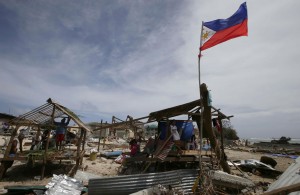Today the Eastlit editorial January 2014 is by another guest. This time Carol Colborn writes on the Philippines and recent tragedy.
Responding to Disaster
 Last Sunday I published my usual weekly post on my blog. It was about ‘Choosing Club Memberships for Social Growth’, third in a series of how Bill and I are getting settled at Viewpoint RV Golf and Tennis Resort in Phoenix, Arizona. Little did I know that a ‘perfect storm in terms of its sheer size, its circular symmetry and the tightness of its eye’ had set a world record and, the day before, hit Leyte and Samar, the third poorest province in the Philippines (poverty incidence at 59.4%), hard. How insensitive of me, to publicize the luxury of resort living while countless people suffered back home! A rightful nudge by my friend June Lopez and concerned inquiries by neighbors, family, and friends woke me.
Last Sunday I published my usual weekly post on my blog. It was about ‘Choosing Club Memberships for Social Growth’, third in a series of how Bill and I are getting settled at Viewpoint RV Golf and Tennis Resort in Phoenix, Arizona. Little did I know that a ‘perfect storm in terms of its sheer size, its circular symmetry and the tightness of its eye’ had set a world record and, the day before, hit Leyte and Samar, the third poorest province in the Philippines (poverty incidence at 59.4%), hard. How insensitive of me, to publicize the luxury of resort living while countless people suffered back home! A rightful nudge by my friend June Lopez and concerned inquiries by neighbors, family, and friends woke me.
The status updates from friends in the Philippines on Facebook at the time were more about how surprisingly good disaster preparedness was this time compared to previous calamities. The Philippines has one of the highest incidences of natural calamities in the world. But when news trickled in about the real situation, the status updates changed overnight. The extent of the devastation was revealed; almost 5,000 were dead and missing and 4 million displaced and affected. And the emotional response is overwhelming. The US takes the lead in what is projected to be the third highest disaster aid in its history, behind the Haitian earthquake and the Indonesian tsunami. (http://www.usatoday.com/story/news/nation/2013/11/13/donations-typhoon-stricken-philippines/3508929/). That is not even counting heroic help from US military.
Being 10,000 miles away, all Bill and I could do was to donate money to a reputable agency, the UN’s World Food Programme USA. And then we saw how a friend, Monette Hamlin, purchased 10 water filtration systems for help that has tremendous multiplier effect. And how another friend, Jennifer Simons, pioneered in the relief efforts for those who were evacuated to Manila. Or how the brother of a friend, Orly Tugob, reveled in the exercise he freely got as he carried heavy relief goods in Tacloban. So many inspiring stories in the face of adversity were shared in media, mainstream or social. Even Anderson Cooper finally admitted that he was amazed at the extraordinary strength of the Filipino people (http://au.ibtimes.com/articles/522424/20131115/haiyan-anderson-cooper-philippines-strength-extraordinary.htm#.Uoa02MSsiSo).
And then, in the midst of the chaos that is natural in disaster scenarios, negativity found its way into people’s psyche. Leaders began to be bashed for perceived incompetence, people began to criticize journalists’ reports, and looting was blamed on negligent law enforcement officers. My daughter April, tucked away in Newcastle upon Tyne in England, cried her heart our and wrote an inspiring appeal on her Facebook page, which she followed with concrete informational help, for focus on positive things. Similarly, Bobbi Jo Domingo, a colleague from Development Academy of the Philippines, wanted to raise the level of discussion to something more fruitful. This is my small contribution towards their cry.
I sincerely hope that the six basics of disaster response continue to be taken care of in the 3-6 months critical period: evacuation, medical help, food and water, improvised shelter, and infrastructure for better distribution and communication. It is also a must to remember that staying with the positive will beget more positives. Negatives may just turn away potential donors. And then, the Philippines cannot escape looking into the future for disaster risk reduction. If we do not have any experts in the science of disaster management, it will be worth our while to send scholars since such degrees are already being offered, as a matter of course, in American schools of higher learning. Hopefully, lessons learned are institutionalized in a more effective National Institution. Lastly, we can only be proud of economic gains if they are spread more evenly so that fewer Filipinos have to live in shoddy shanties by the sea, ready to be wiped away by the next big storm or gobbled up by the next big earthquake. http://ideas.time.com/2013/11/14/stop-catastrophizing-relief-efforts-in-the-philippines/

